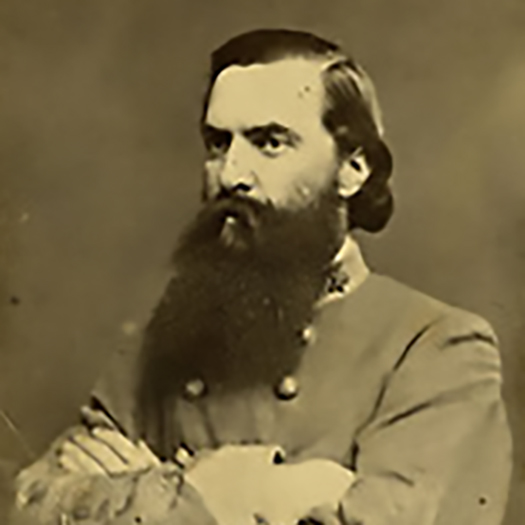William G. Delony
William G Delony (1826-1863) earned a reputation as both an excellent teacher in the Franklin College at the University of Georgia and as a successful Athens attorney before the Civil War. At the outbreak of the war, he raised a cavalry unit dubbed the Georgia Troopers. The Georgia Troopers became a part of T.R.R. Cobb’s Georgia Legion and Delony rose to command the cavalry of the Legion with the rank of Lieutenant Colonel. An aggressive and courageous warrior, he sustained a serious wound to the leg in fighting at Jack’s Shop on September 22, 1863 and was captured by Federal forces. He died of gangrene on October 2, 1863 at age 37.
Born in McIntosh County, in 1826, William Gaston Delony’s family relocated to Athens so that their son might attend the University of Georgia. He graduated with first honors in the Class of 1846. After graduating, he relocated to southwest Georgia and embarked on a career as a planter. Eventually, he returned to Athens to serve as a member of the University of Georgia faculty. During his tenure as a professor, he studied law under the direction of William L. Mitchell and upon passing the bar, he embarked on a legal career. He served in the Georgia legislature, but cut short his political career upon the outbreak of the Civil War. He raised a volunteer cavalry unit called the Georgia Troopers. The Georgia Troopers soon became part of Thomas R.R. Cobb’s Georgia Legion. The Legion saw considerable action as part of Robert E, Lee’s Army of Northern Virginia. Delony soon earned a reputation as a bold and fearless fighter. Wiley C. Howard, a member of the Legion later recalled of Delony, “He was a game fighter and dared to attempt anything.” Elevated to the rank of Lieutenant Colonel, Delony assumed command of the Legion’s cavalry units. After seeing action in several major battles such as Brandy Station and Gettysburg, he suffered a serious wound to the thigh at the largely forgotten clash at Jack’s Shop, Virginia, on September 22, 1863. Captured by the Union forces, he was transported to Washington, DC. His wound turned gangrenous and he died on October 2, grieving that he died amid strangers and so far removed from his wife and children.


